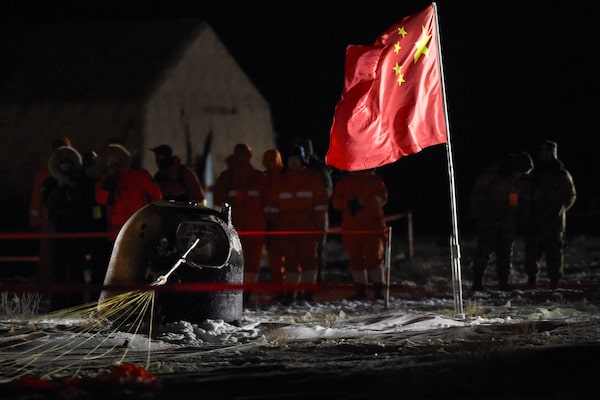
In this photo released by Xinhua News Agency, recovery crews look at the capsule of the Chang'e 5 probe after its successful landing at the main landing site in Siziwang district, north China's Inner Mongolia Autonomous Region on Dec. 17, 2020.Peng Yuan/The Associated Press
China may have been a latecomer to the moon, but with its latest successful mission there, it is setting the stage for a new space race over the coming decades: this time over lunar resources that could propel deeper space exploration.
The country’s Chang’e-5 spacecraft returned as much as 4.4 pounds of lunar rock and soil to Earth on Thursday morning, gathered from a volcanic plain known as Mons Rumker. The three-week operation, which officials described as flawless, underlined China’s growing prowess and ambition in space.
In a statement, the China National Space Administration said a capsule with the moon rocks landed in Inner Mongolia at about 2 a.m. local time (around 1 p.m. Eastern time on Wednesday). The capsule had separated from the main spacecraft when it was about 3,000 miles above the southern Atlantic Ocean. At an altitude of about six miles, it deployed its parachutes.
Video broadcast on state television showed recovery teams arriving at the capsule less than an hour after the landing. It may take hours for the capsule to be transferred to facilities where it can be confirmed that the lunar samples are intact.
The United States and the Soviet Union brought back lunar samples more than four decades ago, but that was a different era of space exploration. Today’s competition – once seemingly the realm of science fiction – could be equally intense and more mercantile.
China is eager to flaunt its technical skills and contribute to the scientific exploration of the solar system. Like the United States, it also has the broader goal of establishing and securing access to a base on the moon that could exploit its potential resources and serve as a launch pad for missions beyond.
Space now is fast becoming one more arena where the two countries might clash. Although China’s military and civilian space program are still catching up with those in the United States, the country’s ambitions were part of the Trump administration’s motivation to set up a Space Force.
China’s leader, Xi Jinping, has made space a central part of his dream of creating a greater, more powerful China and, despite occasional setbacks, the space program has made enormous progress.
“They are able to commit to a much longer-term goal,” said Namrata Goswami, an independent analyst and co-author of a new book on space exploration, Scramble for the Skies.
Globe science reporter, Ivan Semeniuk, explains how fire works in space, and if you could really light a match on the moon.
Globe and Mail Update
Our Morning Update and Evening Update newsletters are written by Globe editors, giving you a concise summary of the day’s most important headlines. Sign up today.